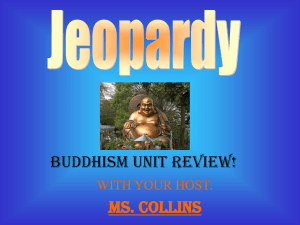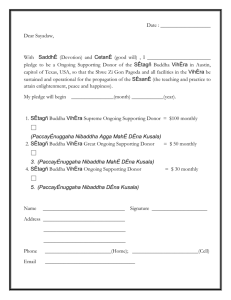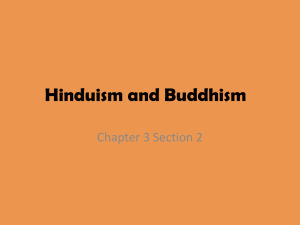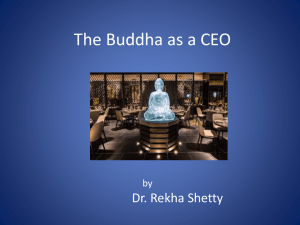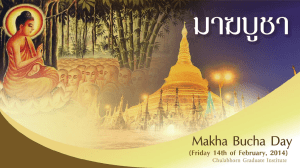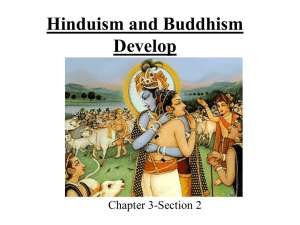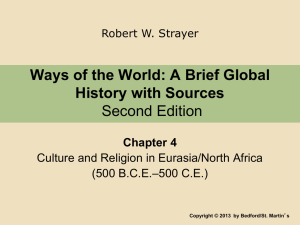Geographical spread of Buddhism during
advertisement
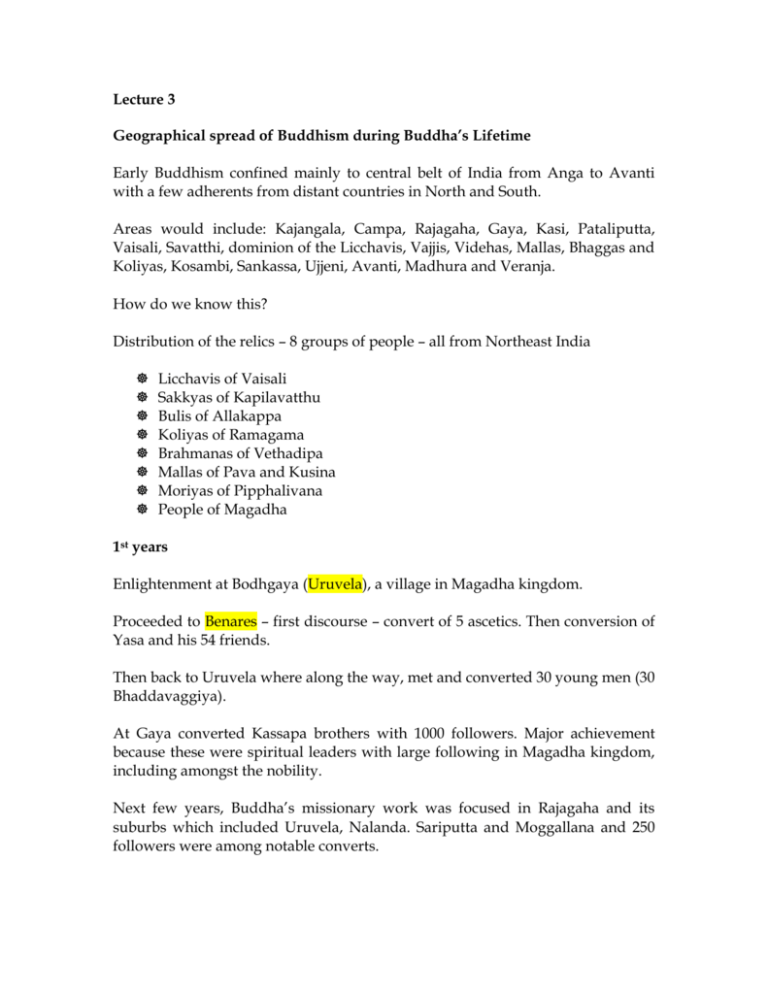
Lecture 3 Geographical spread of Buddhism during Buddha’s Lifetime Early Buddhism confined mainly to central belt of India from Anga to Avanti with a few adherents from distant countries in North and South. Areas would include: Kajangala, Campa, Rajagaha, Gaya, Kasi, Pataliputta, Vaisali, Savatthi, dominion of the Licchavis, Vajjis, Videhas, Mallas, Bhaggas and Koliyas, Kosambi, Sankassa, Ujjeni, Avanti, Madhura and Veranja. How do we know this? Distribution of the relics – 8 groups of people – all from Northeast India Licchavis of Vaisali Sakkyas of Kapilavatthu Bulis of Allakappa Koliyas of Ramagama Brahmanas of Vethadipa Mallas of Pava and Kusina Moriyas of Pipphalivana People of Magadha 1st years Enlightenment at Bodhgaya (Uruvela), a village in Magadha kingdom. Proceeded to Benares – first discourse – convert of 5 ascetics. Then conversion of Yasa and his 54 friends. Then back to Uruvela where along the way, met and converted 30 young men (30 Bhaddavaggiya). At Gaya converted Kassapa brothers with 1000 followers. Major achievement because these were spiritual leaders with large following in Magadha kingdom, including amongst the nobility. Next few years, Buddha’s missionary work was focused in Rajagaha and its suburbs which included Uruvela, Nalanda. Sariputta and Moggallana and 250 followers were among notable converts. Consolidation in Magadha – a prosperous and powerful kingdom with large population for the day. Early years, Buddha and his monks wandered without stable lodging. Moving from place to place to spread Dhamma. Stayed in caves (guhā) , forests (arama), mountains (pabbata), mountain slope (kandara), foot of trees (rukkhamula), cemeteries (susāna), thickets (vanapantha), open air (abbhokāsa) and heaps of straw (palālapuñja). Buddha himself stayed in hills around Rajagaha, on a mountain Gijjhakuta (Vulture’s Peak). Some of the names of places Buddha and his monks stayed in included: Corapapāta (cora – thieves; papāta – precipice --> place where thieves were thrown over to their death); Kālasilā (kāla – black; silā – stone --> black mountain --> also where Moggallana himself was murdered); Vebharapabbata – where the 1st Council was held in the Sattapanni guhā; Gomatakandara (another mountain near Rajagaha); Pipphali guha; etc King Bimbisara was the first to offer Buddha a piece of land for exclusive use of monks – Veluvana -- bamboo grove. Buddha advised that land should not be too near or too far from town so that it would not be too difficult for monks to go on dana while accessible for lay followers. Not too crowded. Good for meditation. Subsequently, a millionaire in Rajagaha also offered to build lodging for Sangha use. Buddha approved. His construction was the beginning of monasteries – eventually to become seats of Dhamma learning. Lifestyle of monks began to change because now they could stay put to teach and learn. Buddha allowed 5 kinds of abode: 1. 2. 3. 4. 5. Vihara – monasteries Addhayoga – cottage Pāsāda – storied building Hammiya – attic Guhā -- cave Devadatta later asked Buddha to forbid all these and permit only rukkhamula – Buddha refused. Other prominent places of Buddha’s missionary work Rajagaha (capt of Vigorous missionary work; impt centers wld include Gaya, Uruvela Magadha) and Nalanda. Domain of one of Buddha’s staunchest royal patron – Bimbisara – 1st monastery – Veluvana; rules for welfare of Sangha, Uposatha day, protection of monks. Conversion of Sariputta and Moggallana and 250 followers. Nalanda Near Rajagaha – famous center of Buddhism. Later here rose a famous Buddhist University for monks. Unfortunately destroyed by Muslim invaders. Buddha had lots of disciples here. Probably a hot favorite with sramanas because Mahaveera, Jainism founder also had a center here. Pataliputta Eventually capital of Emperor Asoka. But during time of Buddha , it was a thriving little town. Buddha stayed here on his way to Kusinara. Ajatasattu’s ministers consulted Buddha abt attack on Vajjians. Buddha talked about 7 conditions of welfare. Impt Buddhist center. Kasi – Benares site of first few conversions – preached Dhammacakkappavattana & (chief city) Anattalakkhana Suttas to 5 monks/arahants Yasa and his 54 friends Sāvatthi (capt of Very impt center of Buddha’s missionary activities – spent the last 25 Kosala) years of his life. Where most number of suttas were delivered and where most Vinaya rules were formulated. Site of Jetavana where Buddha spent 19 rainy retreats and delivered 844 suttas, and Pubbarama where he spent 6 retreats. Domain of Pasenadi, another royal patron, as well as his millionaire suppowers, Anāthapindika and Visākhā. Kapilavatthu Buddha’s birth place and domain of Sakyas. Actually fell under suzerainty of Pasenadi. Vesali Capt of Licchavis. Ratana Sutta preached here. Licchavi nobles built many caiyas for Buddha’s meditation. Spent 5th Vassa here. Kosambi Capt of Vatsas kingdom. Buddha visited several times and estd faith on strong foundation. Spent 9th and part of 10th Vassa here (but left for Parileyyaka Forest when he could not stop dispute between 2 groups of monks). 2 famous monasteries: Ghositārāma and Kukkutārāma. Famous disciple, Brahmin Pindola Bharadvāja who became a monk and was declared foremost amongst those who had lion’s roar (Sihanadikānam) – could mean that he preached so well that he successfully converted many Brahmins. King Udena was an admirer under influence of Sāmāvati and Bhikkhu Pindola Bharadvaja. Avanti Mahakaccayana, son of royal priest of King Canda Pajjota and nephew of Asita, brought Buddhism from Benares to Avanti. On advice of Asita, he and friends visited Buddha. Note – impt – very famous seaport and able to maintain links with other regions beyond India. Malla Republic: 2 groups of Mallas. Kusinara is capital of one of the groups. Site of Kusinara and Buddha’s parinibbana and also where his relics were divided. Pava Anga Eastern limit reached by Buddhism during Buddha’slifetime. Conversion of a Brahmana teacher living at Champa with 300 students. Several devotees and Buddha visited a few times. Famous monk – Sona Kolivisa – foremost for melodious voice. Kuru One of the northern most places mentioned of that time – ancient home of highest Brahmanic culture – 2 very impt suttas delivered here – Satipatthāna and Mahanidana (Dependant Origination) – clear suggestion that people here were spiritually advanced. Madda Far North. Home of Ven Mahakappina – foremost of those who instructed Bhikkhus. Bhaddā Kāpilāni – foremost of Bhikkunis with power of ante-natal retrocognition (past lives). Clear that Buddhism spread widely to the North but not down South. Veranja Western-most point reached by Buddha himself. Place near Madhura, in the 12th year of enlightenment. Almost starved.

